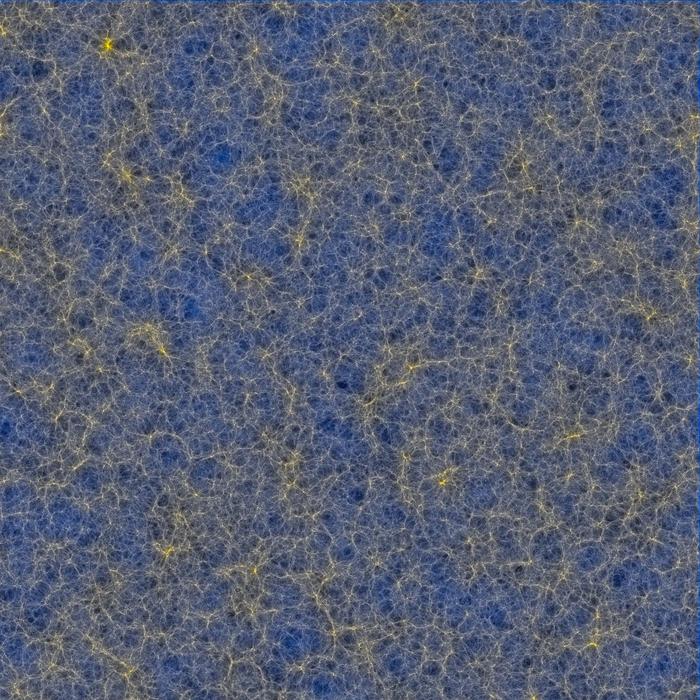Astronomers have carried out the biggest ever computer simulations from the Big Bang to the present day to investigate how the Universe evolved.

Credit: Image credit Josh Borrow, the FLAMINGO team and the Virgo Consortium.
Astronomers have carried out the biggest ever computer simulations from the Big Bang to the present day to investigate how the Universe evolved.
The FLAMINGO simulations calculate the evolution of all the components of the Universe – ordinary matter, like stars and planets, dark matter and dark energy – based on the laws of physics.
As the simulations progress, virtual galaxies and galaxy clusters emerge in precise detail.
The team behind FLAMINGO, from Durham University, UK, Leiden University, the Netherlands, and Liverpool John Moores University, UK, hope the simulations will allow researchers to compare the virtual Universe with observations of the real thing being captured by new high-powered telescopes, like the James Webb Space telescope.
This could help scientists understand if the standard model of cosmology – used to explain the evolution of the Universe – provides a good description of reality.
The first research papers from FLAMINGO have been published in the journal Monthly Notices of the Royal Astronomical Society.
Previous simulations, which have been compared to observations of the Universe, have focused on cold dark matter – believed to be a key component of the structure of the cosmos.
However, astronomers now say that the effect of ordinary matter, which makes up only sixteen per cent of all matter in the Universe, and neutrinos, tiny particles that rarely interact with normal matter, also need to be taken into account when trying to understand the Universe’s evolution.
FLAMINGO Principal Investigator Professor Joop Schaye, of Leiden University, said: “Although the dark matter dominates gravity, the contribution of ordinary matter can no longer be neglected since that contribution could be similar to the deviations between the models and the observations.”
The FLAMINGO simulations tracked the formation of the Universe’s structure in dark matter, ordinary matter and neutrinos, following the standard model of physics.
The team ran the simulations at a powerful supercomputer in Durham over the past two years using different resolutions and also altered other factors such as the strength of galactic winds and the mass of the neutrinos.
The first results showed that the inclusion of ordinary matter and neutrinos in the simulations is essential for making accurate predictions.
New telescopes, such as the international “Dark Energy Survey Instrument” (in which Durham is a partner) and the European Space Agency’s Euclid space telescope, are collecting huge amounts of data about galaxies, quasars and stars, and these observations are posing questions about the theories behind current understanding of the evolution of the Universe.
Simulations like FLAMINGO will play a key role in interpreting this data by comparing theoretical predictions with observational data.
FLAMINGO research collaborator Professor Carlos Frenk, Ogden Professor of Fundamental Physics, in the Institute for Computational Cosmology, Durham University, said: “Cosmology is at a crossroads.
“We have amazing new data from powerful telescopes some of which do not, at first sight, conform to our theoretical expectations. Either the standard model of cosmology is flawed or there are subtle biases in the observational data.
“Our super precise simulations of the Universe should be able to tell us the answer.”
The simulations took more than 50 million processor hours on the Cosmology Machine (COSMA 8) supercomputer, hosted by the Institute for Computational Cosmology, Durham University, on behalf of the UK’s DiRAC High-Performance Computing facility.
To make the FLAMINGO simulations possible, the researchers developed a new code, called SWIFT, which efficiently distributes the computational work over thousands of Central Processing Units (CPUs, sometimes as many as 65,000.
The large amount of (virtual) data created by the simulations provides opportunities to make new theoretical discoveries and to test new data analysis techniques, including machine learning.
FLAMINGO is a project of the Durham-based VIRGO consortium for cosmological supercomputer simulations. The acronym stands for Full-hydro Large-scale structure simulations with All-sky Mapping for the Interpretation of Next Generation Observations.
Funding for FLAMINGO came from the European Research Council, the UK’s Science and Technology Facilities Council, the Netherlands Organization for Scientific Research and the Swiss National Science Foundation.
ENDS
Journal
Monthly Notices of the Royal Astronomical Society
DOI
10.1093/mnras/stad2540/7291940
Method of Research
Computational simulation/modeling
Subject of Research
Not applicable
Article Title
FLAMINGO: Calibrating large cosmological hydrodynamical simulations with machine learning
Article Publication Date
24-Oct-2023




